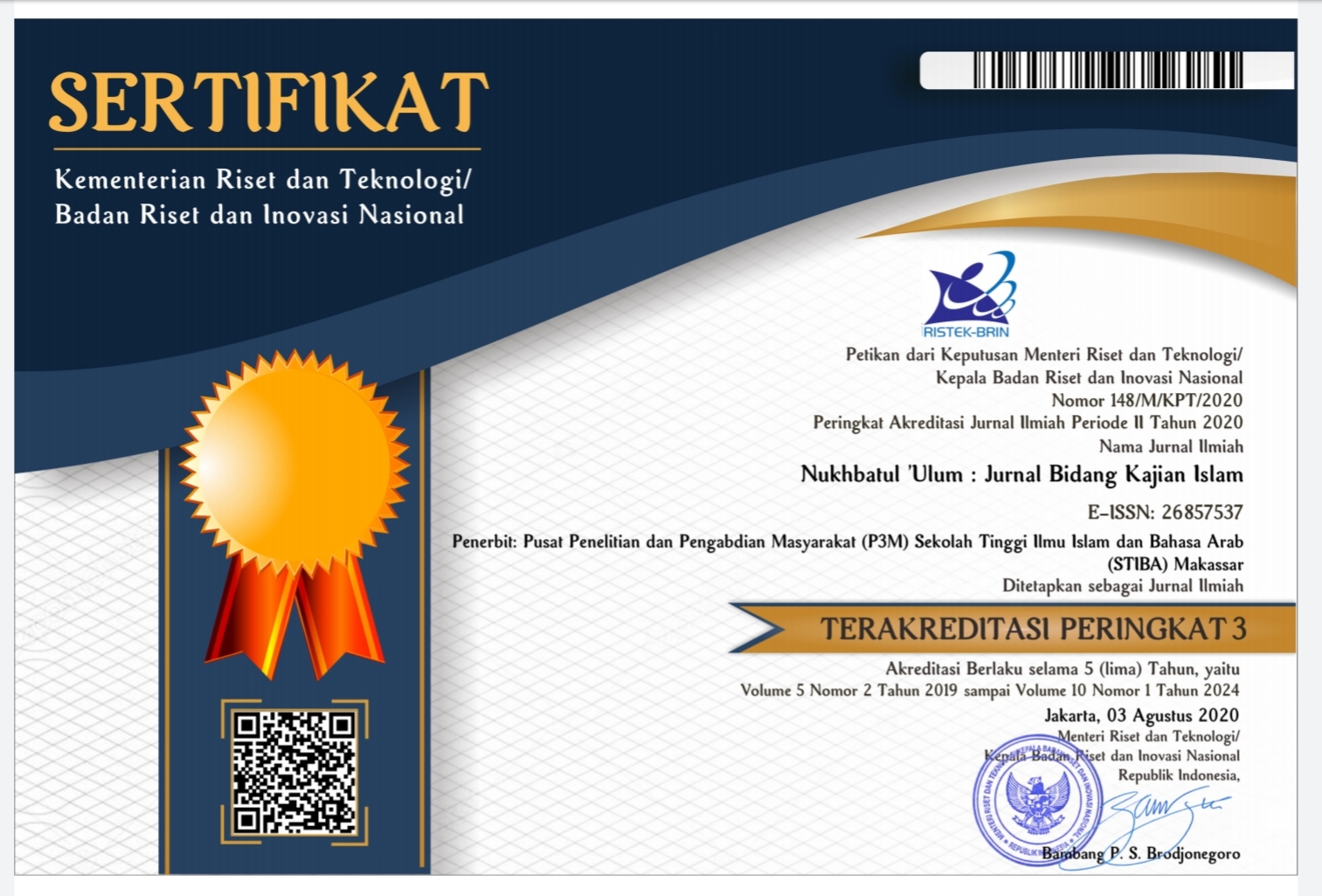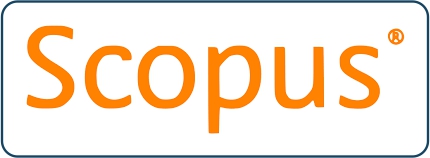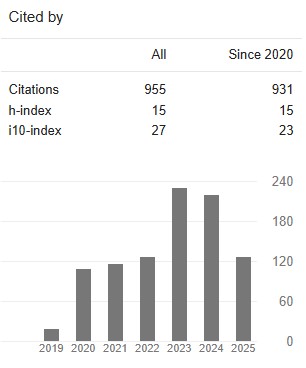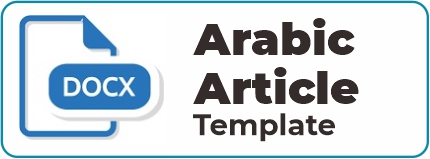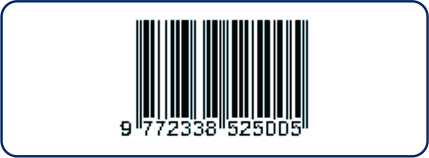Globalisasi dan Pembelajaran Sosial-Emosional Berbasis Pendidikan Islam
Globalization and Social-Emotional Learning Based on Islamic Education
DOI:
https://doi.org/10.36701/nukhbah.v9i2.1009Keywords:
globalization, social-emotional learning, Islamic educationAbstract
The reseacrh aims to develop the concept of social-emotional learning based on Islamic education in order to enhance students' social and emotional intelligence in Islamic educational institutions in light of difficulties with globalization. The research uses a qualitative approach with library research. Data collection through literature searches was obtained from primary data sources, namely the Qur'an and books of interpretation, and secondary data, namely from various literature books, journals, and other research results relevant to the theme. Data analysis techniques use descriptive and interpretive content analysis which is carried out by reading and reviewing/analyzing the data sources collected. The research results found that the concept of social-emotional learning is based on the main character principles of the characters described in Q.S. al-Aḥzāb/33: 35 as Ten Excellent Characteristics which can be developed into a Social-Emotional Learning program curriculum for students in Islamic educational institutions. The concept of social emotional learning based on Islamic education with specifications on the character concept explained in Q.S. al-Aḥzāb/33: 35 is a catalyst for the development of character education which can be developed in further research to be implemented.
Downloads
References
Abuddin, Nata. Inovasi Pendidikan Islam. Jakarta: Penerbit Salemba Diniyah, 2016.
Al-Qurthubi, Imam. Tafsir Al-Qurthubi. Edited by M Iqbal Kadir. Terjemahan. Jakarta: Pustaka Azzam, 2008.
Al-Sheikh, Basil, and Sulaiman B. “Approaches for Teaching, Learning, and Doing Research as Deduced from the Qur’an and Sunnah.” Basil Al-Sheikh Dan Sulaiman B, Approaches for Teaching, Learning, and Doing Research as Deduced from the Qur’an and Sunnah, The International Medical Journal, Vol. 8, No. 2, College of Applied Medical Sciences, King Faisal University, Dammam, Saudi Arabi 8, no. 2 (2009). https://doi.org/https://doi.org/10.31436/imjm.v8i2.759.
Alim, Akhmad. Pendidikan Jiwa: Terrapi Spiritual Manusia Moderen. Jakarta: Al Mawardi Prima, 2018.
Amita Gupta. “How Neoliberal Globalization Is Shaping Early Childhood Education Policies in India, China, Singapore, Sri Lanka and The Maldives.” Policiy Futures in Education 16, no. 1 (2018): 11–28.
As-Sa’di, Syaikh Abdurrahman bin Nashir. Tafsir Al-Qur’an. Jakarta: Darul Haq, 2018.
Atta Quainoo, Eric, Ruby Aggrey, Derrick Aggrey, Francis Adams, Ernest Opoku, and Zakaria Wanzam Abubakari. “The Impact of Globalization on Education: A Blessing or a Curse.” Education Journal 11, no. 2 (2022): 70. https://doi.org/10.11648/j.edu.20221102.13.
Az-zuhaili, Wahbah. Tafsir Al-Munir: Akidah, Syariah Dan Manhaj. Edited by Abdul Hayyie al Kattani. Terjemahan. Jakarta: Gema Insani, 2013.
Barchard, Kimberly A. “Does Emotional Intelligence Assist in the Prediction of Academic Success.” Educational and Psychological Measurement 63, no. 5 (2003): 840–58. https://doi.org/10.1177/0013164403251333.
Bennabi, Malik. The Qur’anic Phenomenon: An Essay of a Theory on the Qur’an. Kuala Lumpur, Malaysia: Islmaic Book Trust, 2001.
Brackett, Marc A, Craig S Bailey, Jessica D Hoffmann, Dena N Simmons, Marc A Brackett, Craig S Bailey, Jessica D Hoffmann, et al. “RULER : A Theory-Driven , Systemic Approach to Social , Emotional , and Academic Learning.” Educational Psychologist 54, no. 3 (2019): 144–61. https://doi.org/10.1080/00461520.2019.1614447.
C.C. Wolhuter, and Eweling K. “Reframing the Concept of Globalization and Human Capital in Contemporary Education.” International Journal of Educational Research, Elsevier, 118 (2023).
Darling-Hammond, Linda, Lisa Flook, Channa Cook-Harvey, Brigid Barron, and David Osher. “Implications for Educational Practice of the Science of Learning and Development.” Applied Developmental Science 24, no. 2 (2020): 97–140. https://doi.org/10.1080/10888691.2018.1537791.
Direktorat Jendral Pendidikan Islam. “Laporan Kinerja Program Pendidikan Islamtahun 2021 Direktorat Jenderal Pandidikan Islam,” 2021, 1–50.
Durlak, Joseph A., Celene E. Domitrovich, Roger P. Weissberg, and Thomas P. Gullotta. Handbook of Social and Emotional Learning. New York & London: The Guilford Press, 2015.
Durlak, Joseph A., Roger P. Weissberg, Allison B. Dymnicki, Rebecca D. Taylor, and Kriston B. Schellinger. “The Impact of Enhancing Students’ Social and Emotional Learning: A Meta-Analysis of School-Based Universal Interventions.” Child Development 82, no. 1 (2011): 405–32. https://doi.org/10.1111/j.1467-8624.2010.01564.x.
Elias, Maurice J., and Al Et. Promoting Social and Emotional Learning: Guidelines for Educators. Alexandria, Virginia, USA: Association for Supervision and Curriculum Development, 1997. http://books.google.com/books?hl=en&lr=&id=AOlqSwQPo9cC&oi=fnd&pg=PR5&dq=Rachael+Kessler&ots=GpKEJ_q5Vc&sig=7SDEQMpnURiu9cwkcJpf8J9CSD4.
Eloy Gálvez-López. “Formative Feedback in a Multicultural Classroom: A Review, Teaching in Higher Education.” Routledge, Taylor Francis Online Journal, 2023, 1–20.
Farid, Ahmad. Pendidikan Berbasis Metode Ahlus Sunnah Wal Jamaah. Surabaya: Pustaka eLBA, 2011.
Gupta, Amita. “How Neoliberal Globalization Is Shaping Early Childhood Education Policies in India, China, Singapore, Sri Lanka and the Maldives.” Policy Futures in Education 16, no. 1 (2018): 11–28. https://doi.org/https://doi.org/10.1177/1478210317715796.
Hidayat, Mupid, R. W. A Rozak, K. A. Hakam, M. D. Kembara, and M. Parhan. “Character Education in Indonesia: How Is It Internalized and Implemented in Virtual Learning?” Cakrawala Pendidikan: Jurnal Ilmiah Pendidikan 41, no. 1 (2022): 186–98. https://doi.org/http://dx.doi.org/10.21831/cp.v41i1.45920.
Husaini, Adian. Pendidikan Islam: Mewujudkan Generasi Gemilang Menuju Negara Adidaya 2045. Jakarta: Yayasan Pendidikan Islam At - Taqwa, 2018.
Iqbal, Muhammad Adil. “Islam, Globalism and Globalisation.” Journal of Islamic Governance, no. October (2021). https://doi.org/10.53105/tp-12.
Ivandianto. “Facing the Industrial Revolution 4.0 with Sufistic Transpersonal Psychology” 395, no. Acpch 2019 (2020): 6–10. https://doi.org/10.2991/assehr.k.200120.002.
Joanna Samul. “Emotional and Spiritual Intelligence of Future Leaders: Challenges for Education, .” MPDI Education Sciences, 10, no. 7 (2020): 1–10.
Jones, Stephanie M, Michael W Mcgarrah, Jennifer Kahn, Stephanie M Jones, Michael W Mcgarrah, and Jennifer Kahn. “Social and Emotional Learning : A Principled Science of Human Development in Context Social and Emotional Learning : A Principled Science of Human Development in Context.” Educational Psychologist 0, no. 0 (2019): 1–15. https://doi.org/10.1080/00461520.2019.1625776.
Julian Sefton-Green, and Liora Bresler. “Theories and Histories: Creative Learning and Its Contexts.” In Handbook of Creative Learning. New York: Te Routledge International Book Series, 2011.
Khairudin, Sheikh Muhamad Hizam Sheikh, and Mohammad Amin Mohammad. “The Role of Information Technology on the Muslim Community in the Era of Globalization and Digitalizatio.” Journal of Information Technology Management 13, no. 3 (2021). https://doi.org/DOI: http:// 10.22059/jitm.2021.83236.
Khan, Aga (H.H. Prince Karim). “Annual Meeting of the International Baccalaureate 2008.” 2012. httos://www.ismaili.net/timeline/2008/us/20080424global.html.
Khilmiyah, Akif, and Fitriah M Suud. “Innovation of Islamic Religious Education Learning with Social Emotional Learning Approach to Improve Character.” International Journal of Innovation, Creativity and Change. Www.Ijicc.Net 13, no. 7 (2020): 2020. https://www.ijicc.net/images/vol_13/Iss_7/13767_Khilmiyah_2020_E_R.pdf.
Kismiati, Dyah Aniza. “Implementasi Nilai-Nilai Social Emotional Learning (SEL) Melalui Permainan Monopoli Sistem Pendengaran Untuk Siswa SD,” 2019, 30–36.
M. Bracket, Craig S. Bailey, and Denna N. Simmons. “Ruler: A Theory-Driven, Systemic Approach to Social, Emotional, and Academic Learning.” Educational Psychologist 54, no. 3 (2019): 144–61.
Malik Bennabi. The Qur’anic Phenomenon. Malaysia: Islamic Book Trust, 2001.
Marshall, Katherine. “Global Education Challenges: Exploring Religious Dimensions.” International Journal of Educational Development 62 (September 1, 2018): 184–91. https://doi.org/10.1016/J.IJEDUDEV.2018.04.005.
Mo, Magdalena, and Ching Mok. “Social and Emotional Learning.” Educational Psychology 39, no. 9 (2019): 1115–18. https://doi.org/10.1080/01443410.2019.1654195.
Mori, Lynsey. “Towards a Perfect Universal Educational Curriculum.” Contemporary Educational Researches Journal 12, no. 4 (2022): 256–62. https://doi.org/10.18844/cerj.v12i4.8486.
Moyle, Kathryn, Anita Rampal, Dewi Rochsantiningsih, and Kristiandi. “Rapid Review of Curriculum 2013 and Textbooks.” Agency for Research and Development (BALITBANG), Ministry of Education and Culture, 2017.
Muhammad Adil Iqbal and Shaikh Abdul Mabud. “Challenge of Globalisation to the Muslim Ummah: Religious Extremism and the Need for Middle Path (Wasat).” Strategic Studies 39, no. 3 (2019): 73–88. https://doi.org/10.53532/ss.039.03.00106.
Muhammad Iwan Abdi. “The Implementation of Character Education in Kalimantan Indonesia: Multi Site Studies,.” Journal of Education, Dinamika Ilmu, IAIN Samarinda 18, no. 2 (2018). https://doi.org/https://doi.org/10.21093/di.v18i2.1289.
Nata, Abuddin. Pemikiran Pendidikan Islam Dan Barat. Jakarta: Rajagrafindo Persada, 2013.
Oberle, Eva, and Kimberly A. Schonert-Reichl. “Social and Emotional Learning: Recent Research and Practical Strategies for Promoting Children’s Social and Emotional Competence in Schools,” no. October (2017): 175–97. https://doi.org/10.1007/978-3-319-64592-6_11.
Ozer, Simon, Jonas R. Kunst, and Seth J. Schwartz. “Investigating Direct and Indirect Globalization-Based Acculturation.” International Journal of Intercultural Relations 84, no. July (2021): 155–67. https://doi.org/10.1016/j.ijintrel.2021.07.012.
Pearlman, Bob. “Twenty-First Century Learning in School: A Case Study of New Technology High School in Napa, California.” New Directions for Youth Development, no. 110 (2006): 101–12. https://doi.org/10.1002/yd.170.
Qaradhawi, Yusuf Al. Sunnah Rasul Sumber Ilmu Pengetahuan Dan Peradaban. Jakarta: Gema Insani Press, 1998.
Quthb, Sayyid. Tafsir Fii Dzilalil Qur’an: Di Bawah Naungan Al Qur’an. Jakarta: Robbani Press, 2009.
Quthb, Sayyid, and penerjemah M. Misbah. Tafsir Fi-Zhilalil Qur’an: Dii Bawah Naungan Al Quran. Jakarta: Robbani Press, 2008.
Radulescu, carmen valentina, Mihaela Diana Oancea Negescu, and Raluca Georgescu. “The Pressure of Globalization on Educational Evolution in Emerging.” SHS Web of Conferencces 74 Globalization & Its Socio-Economic Consequences 06026 (2020). https://doi.org/https://doi.org/10.1051/shsconf/20207406026.
Rahmawati, Dini. “Supporting Students’ Social-Emotional Learning in Indonesian Primary Schools.” University of Jyväskylä, 2019.
Ramayulis. Ilmu Pendidikan Islam. Jakarta: Kalam Mulia, 2002.
Raval, Vaishali V. “From the Margins to the Center: Advancing Research on Caregiver Socialization of Emotion in Asia.” Child Development Perspectives, 2023, 1–7. https://doi.org/10.1111/cdep.12487.
Rehaf A. Madani. “Analysis Of Education Quality, A Goal of Education for All Policy.” Journal Higher Education Studies; 9, no. 1 (2019). https://doi.org/DOI:10.5539/hes.v9n1p100.
Reimers, Fernando M. Educating Students to Improve the World. Springer Briefs in Education, 2020. https://doi.org/10.1007/978-981-15-3887-2.
Rippin, Andrew, and Jawid Mojaddedi, eds. The Wiley Blackwell Companion to the Qur’an. Language. 2nd ed. Wiley Blackwell, 2017. https://doi.org/DOI:10.1002/9781118964873.
Rizvi, Fazal, and B Lingard. Globalization Education Policy. Taylor and Francis, 2009. https://doi.org/10.4324/9780203867396.
Sahlberg, Pasi. “Trends in Global Education Reform since the 1990 s: Looking for the Right Way.” International Journal of Education, Elsevier, Vol. 98, 98 (2023). https://doi.org/https://doi.org/10.1016/j.ijedudev.2023.102748.
Sayyid Quthb, and Penerjemah Fathurrahman. At- Tashwiirul Faniy Fil-Qur’an . Jakarta: Gema Insani , 2004.
Skrzypińska, Katarzyna. “Does Spiritual Intelligence (SI) Exist? A Theoretical Investigation of a Tool Useful for Finding the Meaning of Life.” Journal of Religion and Health 60, no. 1 (2021): 500–516. https://doi.org/10.1007/s10943-020-01005-8.
Syihabuddin. “Landasan Psikologis Pendidikan Islam.” Universitas Pendidikan Indonesia, 2013.
Turner, Bryan S. The Routledge International Handbook of Globalization Studies. Second. New York: The Taylor & Francis e-Library, 2010.
Wirajaya, Ganda, Lingga Agustina Suganda, and Zuraida Zuraida. “Indonesian Students’ Social-Emotional Competencies and Their English Academic Achievement.” Journal of Education and Learning (EduLearn) 13, no. 2 (2019): 163–69. https://doi.org/10.11591/edulearn.v13i2.12160.
Yin Cheong Cheng. New Paradigm For Re-Engineering Education: Globalization, Localization and Individualization. Netherland: Springeronline.com e-book, 2005.
Zakso, Amrazi, Iskandar Agung, Etty Sofyatiningrum, and M Calvin Capnary. “Factors Affecting Character Education in the Development of the Profile of Pancasila Students: The Case of Indonesia.” Journal of Positive School Psychology 6, no. 2 (2022): 2254–73. http://journalppw.com.



